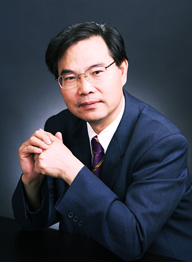Keynote Speeches
Keynote Speech I
On Presuppositions of Machine Learning: A Best-fitting Theory
Machine learning have been applied with a set of prerequisite or hypotheses, the
optimal setting of which is a `the chicken or the egg’ problem. Those hypotheses include in particular
(i) the
Large Capacity Hypothesis on hypothetical space, (ii) the Independence Hypothesis on loss function,
(iii) the
Completeness Hypothesis on training data, (iv) the Prior-Determine-Regularizer Hypothesis on
regularization
terms, and (v) the Euclidean Hypothesis on analysis framework. We analyze the role, effect and
limitations of
those hypotheses in this talk, and propose a systematic way, could named as a best-fitting theory, to break
through each of the hypotheses.
More specifically, we propose the model driven deep learning approach to burst the Large Capacity Hypothesis,
develop a noise modeling principle to breach the Independence Hypothesis, suggest the axiomatic
curriculum/self-paced learning approach for the Completeness Hypothesis, the implicit regularization method for
the Prior-Determine-Regularizer Hypothesis, and Banach space geometry for the Euclidean Hypothesis. In each
case, we show the best-fitting strategy, substantiate the value and outcome of the breaking though. We show also
that the continuing effort for bursting the hypotheses of ML is needed, which is then opening new hot directions
of ML research.
Biosketch
 Zongben Xu
was born in 1955. He received his Ph.D. degrees in mathematics from Xi’an Jiaotong University, China, in 1987.
His current research interests include applied mathematics and mathematical methods of big data and artificial
intelligence. He established the L(1/2) regularization theory for sparse information processing. He also found
and verified Xu-Roach Theorem in machine learning, and established the visual cognition based data modelling
principle, which have been widely applied in scientific and engineering fields. He initiated several
mathematical theories, including the non-logarithmic transform based CT model, and ultrafast MRI imaging, which
provide principles and technologies for the development of a new generation of intelligent medical imaging
equipment. He is owner of the Tan Kan Kee Science Award in Science Technology in 2018, the National Natural
Science Award of China in 2007,and winner of CSIAM Su Buchin Applied Mathematics Prize in 2008. He delivered a
45-minute talk on the International Congress of Mathematicians 2010. He was elected as member of Chinese Academy
of Science in 2011.
Zongben Xu
was born in 1955. He received his Ph.D. degrees in mathematics from Xi’an Jiaotong University, China, in 1987.
His current research interests include applied mathematics and mathematical methods of big data and artificial
intelligence. He established the L(1/2) regularization theory for sparse information processing. He also found
and verified Xu-Roach Theorem in machine learning, and established the visual cognition based data modelling
principle, which have been widely applied in scientific and engineering fields. He initiated several
mathematical theories, including the non-logarithmic transform based CT model, and ultrafast MRI imaging, which
provide principles and technologies for the development of a new generation of intelligent medical imaging
equipment. He is owner of the Tan Kan Kee Science Award in Science Technology in 2018, the National Natural
Science Award of China in 2007,and winner of CSIAM Su Buchin Applied Mathematics Prize in 2008. He delivered a
45-minute talk on the International Congress of Mathematicians 2010. He was elected as member of Chinese Academy
of Science in 2011.
Zongben Xu was the vice-president of Xi’an Jiaotong University. He currently
makes several important services for government and professional societies, including the director for Pazhou
Lab (Guangzhou), director for the National Engineering Laboratory for Big Data Analytics, a member of National
Big Data Expert Advisory Committee and the Strategic Advisory Committee member of National Open Innovation
Platform for New Generation of Artificial Intelligence.
 Zongben Xu
was born in 1955. He received his Ph.D. degrees in mathematics from Xi’an Jiaotong University, China, in 1987.
His current research interests include applied mathematics and mathematical methods of big data and artificial
intelligence. He established the L(1/2) regularization theory for sparse information processing. He also found
and verified Xu-Roach Theorem in machine learning, and established the visual cognition based data modelling
principle, which have been widely applied in scientific and engineering fields. He initiated several
mathematical theories, including the non-logarithmic transform based CT model, and ultrafast MRI imaging, which
provide principles and technologies for the development of a new generation of intelligent medical imaging
equipment. He is owner of the Tan Kan Kee Science Award in Science Technology in 2018, the National Natural
Science Award of China in 2007,and winner of CSIAM Su Buchin Applied Mathematics Prize in 2008. He delivered a
45-minute talk on the International Congress of Mathematicians 2010. He was elected as member of Chinese Academy
of Science in 2011.
Zongben Xu
was born in 1955. He received his Ph.D. degrees in mathematics from Xi’an Jiaotong University, China, in 1987.
His current research interests include applied mathematics and mathematical methods of big data and artificial
intelligence. He established the L(1/2) regularization theory for sparse information processing. He also found
and verified Xu-Roach Theorem in machine learning, and established the visual cognition based data modelling
principle, which have been widely applied in scientific and engineering fields. He initiated several
mathematical theories, including the non-logarithmic transform based CT model, and ultrafast MRI imaging, which
provide principles and technologies for the development of a new generation of intelligent medical imaging
equipment. He is owner of the Tan Kan Kee Science Award in Science Technology in 2018, the National Natural
Science Award of China in 2007,and winner of CSIAM Su Buchin Applied Mathematics Prize in 2008. He delivered a
45-minute talk on the International Congress of Mathematicians 2010. He was elected as member of Chinese Academy
of Science in 2011.